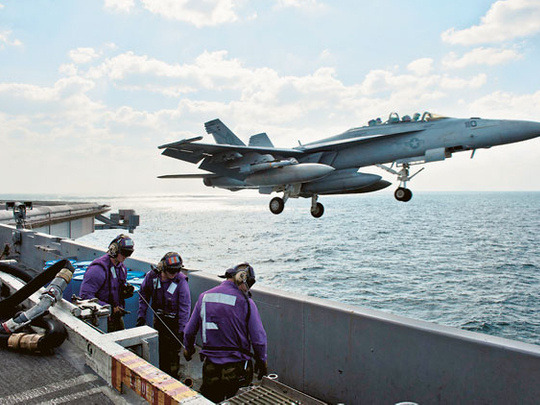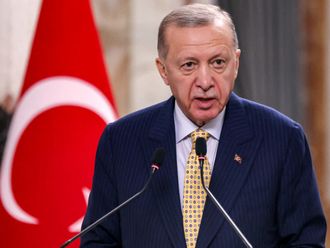
Washington: The United States said on Tuesday that Iran's latest threat to take action if the US Navy moves an aircraft carrier into the Gulf showed that international economic sanctions were putting Tehran in an increasingly difficult position.
"We see these threats from Tehran as just increasing evidence that the international pressure is beginning to bite," State Department spokeswoman Victoria Nuland said.
"They are feeling increasingly isolated and they are trying to divert the attention of their own public from the difficulties inside Iran, including the economic difficulties as a result of sanctions," Nuland told a news briefing.
In Paris, meanwhile, France's foreign minister said there is "no doubt" that Iran is moving toward a nuclear weapon and urged Europe to match America's tighter sanctions set in motion last week. Alain Juppe said the measures could include targeting Iran's Central Bank and imposing an Iranian oil embargo.
Pressure on rial
A Western snub of one of Opec's heavyweight exporters would still leave Iran with many oil-hungry markets such as China and India — and give Tehran crucial economic lifelines to resist the US and its allies. But, worries that Gulf tensions could disrupt supplies sent oil above $101 a barrel and piled more pressure on Iran's currency, the rial, which hit record lows against the dollar this week.
"It's clear the economy is in dire straits and the sanctions are having an impact no matter what Iranian officials say," Salman Shaikh, director of The Brookings Doha Centre in Qatar, said.
"Hitting the oil sectors may push the economy down even further, but that doesn't mean Iran will bend to the West," Shaikh added.
Iran has proposed restarting international talks on its nuclear programme, which Tehran insists is only for peaceful energy and research purposes. The offer to reopen dialogue is interpreted as a sign that Western sanctions are taking a serious bite. But, the outreach could also include pre-conditions such as easing the economic pressures, which would likely meet resistance in Washington and elsewhere.
"This has become the classic Iranian approach all along with the nuclear issue: try to buy some time with offers of co-operation, but then coming back with the hard line," Shaikh said.
In compliance with law
As 10-day naval manoeuvres wrapped up Tuesday, Iran's army chief General Ataollah Salehi said an "American warship" that left the Gulf should not return. The US Navy's 5th Fleet said the aircraft carrier, USS John C. Stennis, and another vessel headed out from the Gulf and through the Strait of Hormuz last week after a visit to Dubai's Jebel Ali port. Pentagon spokesman George Little said on Tuesday the US presence in the Gulf is in compliance with international law and the Navy would maintain what he called a "constant state of high vigilance" in order to ensure the flow of sea commerce.
The 5th Fleet, based in Bahrain, is one of the Pentagon's main counterbalances to Iran's expanding military role in the Gulf. France and Britain also have warships stationed in the region.











